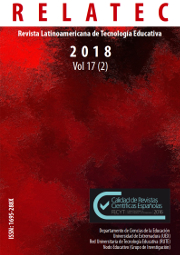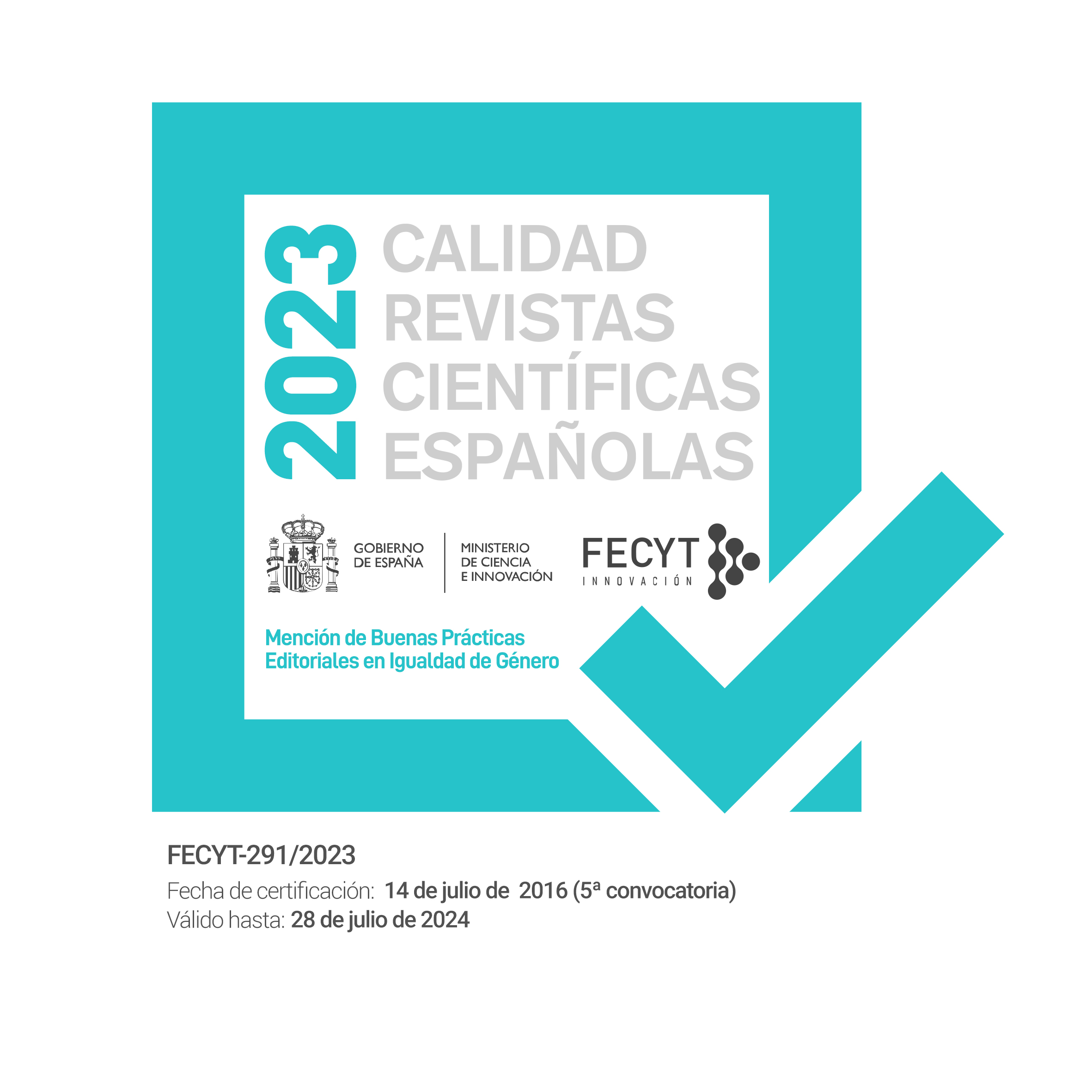Open access and anti-plagiarism in the institutional repositories and libraries of the Faculties of Education in Spain
DOI:
https://doi.org/10.17398/1695-288X.17.2.41Keywords:
repositories, open educational resources, plagiarism, academic libraries, Preservice Teacher EducationAbstract
Institutional repositories are a strategy to promote scientific production and Open Educational Resources (OER) in universities. They offer a service that facilitates educational innovation, but also generate great concern about the lack of respect for copyright. This study analyses information on the open access and antiplagiarism policy established by 62 repositories from 75 Spanish universities that are already using this service. The stratified sample involves 20 libraries from every Faculty of Education in Spain (38.5%). The study used a mixed methodological approach, three different information collection instruments were used: repository analysis questionnaire, analysis of the libraries' web pages and in-depth interviews with those responsible for these services. The results obtained allow us to know the type of information existing in the repositories, the institutional policy of free access to scientific production, as well as the way in which information is informed, acts and prevents plagiarism in them. The conclusion is that university repositories enjoy a high degree of open access to information, but there is not much information about plagiarism. However, libraries report antiplagiarism tools and offer training initiatives.
References
Amiel, T., Da Cruz, M.R. y Da Costa, C.J. (2017). Construindo Políticas de Abertura a partir dos Recursos Educacionais Abertos: Uma Análise do Sistema Universidade Aberta do Brasil. RELATEC: Revista Latinoamericana de Tecnología Educativa. 16 (2), 161-176. https://doi.org/10.17398/1695-288X.16.2.161
Annand, D. y Jensen, T. (2017). Incentivizing the Production and Use of Open Educational Resources in HigherEducation Institutions, International Review of Research in Open and Distributed Learning, 18(4). http://dx.doi.org/10.19173/irrodl.v18i4.3009
Armellini, A. y Nie, M. (2013). Open educational practices for curriculum enhancement. Open Learning, 28(1), 7–20. https://goo.gl/bD4K3P
Badge, J. L., Cann, A. J., y Scott, J. (2007). To cheat or not to cheat? A trial of the JISC plagiarism detection service with biological sciences students. Assessment y Evaluation in Higher Education, 32(4), 433-439. http://dx.doi.org/10.1080/02602930600898569
Bartolomé, A., Mayo, I. C. y Ferrer, J. M. M. (2017). Una revisión a los Practicum de Educación desde las tecnologías. Revista Practicum, 1(1). https://goo.gl/T6SEoS
Barrueco, J., De Miguel, M., González, C. y Rico-Castro, P. (Coords.). (2014). Guía para la evaluación de repositorios institucionales de investigación. FECYT-CRUE-REBIUN. https://goo.gl/5Lh5qd
Bonfá C. R. Z. (2009). Modelo de gestão de periódicos científicos eletrônicos com foco na promoção da visibilidade. Tese de doutorado. Programa de Pós-graduação em Engenharia de Produção, Universidade Federal de Santa Catarina, Brasil. https://repositorio.ufsc.br/handle/123456789/92734
Brandt, J., Gutbrod, M., Wellnitz, O. y Wolf, L. (2010). Plagiarism Detection in Open Access Publications. In Proc. of the 4th Int. Plagiarism Conference. https://goo.gl/9shNUo
Bustos-González, A. y Fernández-Porcel, A. (2008). Directrices para la creación de repositorios institucionales en universidades y organizaciones de educación superior. Repositorio institucional. Universidad Del Rosario. https://goo.gl/gx2uRx
Calderón-Martínez, A. y Ruiz-Conde, E. (2013). Participación y visibilidad web de los repositorios digitales universitarios en el contexto europeo. Comunicar, 20(40), 193–201. https://doi.org/10.3916/C40-2013-03-10
Campbell, E. (2008). The Ethics of Teaching as a Moral Profession. Curriculum Inquiry, 38(4), 357–385. https://doi.org/10.1111/j.1467-873X.2008.00414.x
Cavanillas, S. (2008). El ciberplagio en la normativa universitaria. En R. Comas, J. Sureda (coords.). El ciberplagi acadèmic [dossier en línea]. Digithum, nº 10. http://www.redalyc.org/html/550/55001006/
Cebrián-Robles, V., Raposo-Rivas, M., & Sarmiento-Campos, J.A. (2016). ¿Ética o prácticas deshonestas? el plagio en las titulaciones de educación. Revista de Educación, 374, 161-186. Doi: 10.4438/1988-592X-RE-2016-374-330
Chan, L., Cuplinskas, D., Eisen, M., Friend, F., Genova, Y., Guédon, J.C., Hagemann, M., Harnad, S., Johnson, R., La Manna, M., Rév, I., Segbert, M., de Souza, S., Suber, P. y Velterop, J. (2002). Budapest Open Access Initiative. Budapest. https://goo.gl/TM7dZx
Clements, K. I. y Pawlowski, J. M. (2012). User-oriented quality for OER: understanding teachers’ views on re-use, quality, and trust. Journal of Computer Assisted Learning, 28(1), 4–14. https://doi.org/10.1111/j.1365-2729.2011.00450.x
Clements, K., Pawlowski, J. y Manouselis, N. (2015). Open educational resources repositories literature review – Towards a comprehensive quality approaches framework. Computers in Human Behavior, 51, Part B, 1098–1106. https://doi.org/10.1016/j.chb.2015.03.026
Duarte-Hueros, J., Duarte-Hueros, A. y Ruano-López, S. (2016). Las descargas de contenidos audiovisuales en internet entre estudiantes universitarios. Comunicar, 48, 49-57. doi:10.3916/C48-2016-05
Escobar, J. E. y Cuervo Martínez, Á. (2008). Validez de contenido y juicio de expertos: una aproximación a su utilización. Avances en medición, 6(1), 27–36.
Geser, G. (2007). Open Educational Practices and Resources: The OLCOS Roadmap 2012. RUSC. Universities and Knowledge Society Journal, 4(1). https://doi.org/10.7238/rusc.v4i1.295
George, D. y Mallery, P. (2003). SPSS for Windows step by step: A Simple Guide and Reference. 11.0 Update. Boston: Allyn y Bacon.
Guerrero, P.C., Maldonado, A.A. y Barbosa, R.R.L. (2017). La Ética: una necesidad en las actores del proceso enseñanza aprendizaje en las instituciones de Educación Superior. Red Internacional de Investigadores en Competitividad, 4(1). https://www.riico.net/index.php/riico/article/view/820
Huh, J., Delorme, D. E. y Reid, L. N. (2006). Perceived Third‐Person effects and consumer attitudes on preventing and banning DTC advertising. Journal of Consumer Affairs, 40(1), 90-116.
Kim, J. (2011). Motivations of faculty self-archiving in institutional repositories. The Journal of Academic Librarianship, 37(3), 246-254. doi:10.1016/j.acalib.2011.02.017
Harley, K. (2011). Insights from the Health OER Inter-Institutional Project. Distance Education, 32(2), 213–227. https://doi.org/10.1080/01587919.2011.584848
Hernández, T. H., Rodríguez, D. R. y Bueno, G. B. (2008). Open Access: el papel de las bibliotecas en los repositorios institucionales de acceso abierto. Anales de documentación. Vol. 10, 185-204.
Lane, A. (2012). A review of the role of national policy and institutional mission in European distance teaching universities with respect to widening participation in higher education study through open educational resources. Distance Education, 33(2), 135–150. https://doi.org/10.1080/01587919.2012.692067
López, Ramírez, E.A., Ambulo, P.L. y Campo, V.Z. (2018). Plagio, copiar y pegar, resultado de los malos hábitos. Revista Digital de Ciencias Aplicadas al Deporte, 10(22), 53-64. https://goo.gl/eYY5Y5
Markey, K., Rieh, S. Y., Jean, B. S., Kim, J. y Yakel, E. (2007). Census of institutional repositories in the United States. MIRACLE Project Research Findings.
McGrail, E. y McGrail, J. (2015). Exploring web-based university policy statements on plagiarism by
research-intensive higher education institutions. Journal of Academic Ethics, 13(2), 167-196. https://goo.gl/WpFvTg
Melero, R., Abadal, E., Abad, F. y Rodríguez-Gairín, J.-M. (2009). The situation of open access institutional repositories in Spain: 2009 report. Information research: An International Electronic Journal, 14(4),3. https://goo.gl/3JSsxg
Miravalles, M. P. T. (2012). Recursos Educativos en Abierto: evolución y modelos. Foro de Educación, (14), 191–205.
Nikoi, S. y Armellini, A. (2012). The OER mix in higher education: Purpose, process, product, and policy. Distance Education, 33(2), 165-184. https://goo.gl/8yU2DX
Nunnally, J.C. (1978). Psychometric theory. New York: McGraw-Hill.
OECD/CERI (2008). Four scenarios for Higher Education. París: OECD Publishing, París. Recuperado a partir de https://goo.gl/nL6NQx
Ocholla, D. N. y Ocholla, L. (2016). Does open access prevegher Education. African Journal of Library, Archives and Information Science, 26(2), 189-202. https://goo.gl/di1MTC
Olcott, J. (2012). OER perspectives: emerging issues for universities. Distance Education, 33(2), 283–290. https://doi.org/10.1080/01587919.2012.700561
Puentes, J. R. P. (2009). Plagio, para evitar el plagio. Dimensión empresarial, 7(1), 28–34.
Ramírez-Montoya, M. S. (2013). Retos y perspectivas en el movimiento educativo abierto de educación a distancia: estudio diagnóstico en un proyecto SINED. RUSC. Universities and Knowledge Society Journal, 10(2), 170-186. https://goo.gl/xoAAjW
Rivera-Morales, R.; López-Ibarra, A. y Ramírez-Montoya, M.S. (2011). Estrategias de comunicación para el descubrimiento y uso de recursos educativos abiertos. REICE: Revista Electrónica Iberoamericana Sobre Calidad, Eficacia Y Cambio En Educación, 9(4), 141–157. http://www.redalyc.org/pdf/551/55122156010.pdf
Romero, L. L. M., y Villach, M. J. R. (2016). Usos de las TIC y su temporalidad en prácticas evaluativas del profesorado de educación secundaria. Digital Education Review, (30), 147-164.
Rodríguez, C., Pozo, T., y Gutiérrez, J. (2006). La triangulación analítica como recurso para la validación de estudios de encuesta recurrentes e investigaciones de réplica en educación superior. Revista ELectrónica de Investigación y EValuación Educativa, 12(2) , 289-305. https://goo.gl/DvnRVX
Sánchez, S., y Melero, R. (2006). La denominación y el contenido de los Repositorios Institucionales en Acceso Abierto: base teórica para la «Ruta Verde». Preprint. http://eprints.rclis.org/7613/
Santos-Hermosa, G., Ferran-Ferrer, N., y Abadal, E. (2012). Recursos educativos abiertos: repositorios y uso. El Profesional de La Información, 21(2), 136–145. https://goo.gl/bbYN2r
Santos-Hermosa, G., Ferran-Ferrer, N. y Abadal, E. (2017). Repositories of Open Educational Resources: An assessment of Reuse and Educational Aspects. International Review of Research in Open and Distributed Learning, 18(5). http://www.irrodl.org/index.php/irrodl/article/view/3063
Santos, L. N. S. (2017). Gestão da informação científica aberta: um estudo aplicado a video científico em eventos. Dissertação de Mestrado Programa de pós-graduação em ciência, gestão e tecnologia da Informação. Universidade Federal do Paraná, Brasil.
Sanz-Casado, E., Bautista, N., Lascurain, M.L., Marugán, S., García, C., Casani, F. y Mauleón, E. (2017). Informe IUNE 2017. Actividad investigadora de las universidades españolas. Alianza 4 universidades. https://goo.gl/5hppjg
Serrano-Vicente, R., Melero-Melero, R. y Abadal, E. (2014). Indicadores para la evaluación de repositorios institucionales de acceso abierto. Anales De Documentación, 17(2), 1-12. http://dadun.unav.edu/handle/10171/36761
Smith, B. y Lee, L. (2017). Librarians and OER: Cultivating a community of practice to be more effective advocates. Journal of Library y Information Services in Distance Learning, 11(1-2), 106-17. https://goo.gl/aEfTR9
Sureda-Negre, J., Comas-Forgas, R. y Gili-Planas, M. (2009). Prácticas académicas deshonestas en el desarrollo de exámenes entre el alumnado universitario español. Estudios sobre educación 17, 103-122. http://dadun.unav.edu/handle/10171/9852
Tom, A. R. (1980). Teaching as a Moral Craft: A Metaphor for Teaching and Teacher Education. Curriculum Inquiry, 10(3), 317–323. https://doi.org/10.2307/1179618
Tuomi, I. (2013). Open educational resources and the transformation of education. European Journal of Education, 48(1), 58-78. doi:10.1111/ejed.12019
Wiley, D., Bliss, T. J., y McEwen, M. (2014). Open Educational Resources: A Review of the Literature. In J. M. Spector, M. D. Merrill, E. Elen y M. J. Bishop (Eds.). Handbook of Research on Educational Communications and Technology, 781–789. doi: 10.1007/978-1-4614-3185-5_63
Downloads
Published
Issue
Section
License
Authors who publish in this journal accept the following conditions:
1. The Author retains copyright in the article. Upon acceptance of the article, the author shall grant to the Publisher the right of first publication of the article. with the dcoument registered with the Creative Commons Attribution-NonCommercial-NoDerivative 4.0 International (CC BY-NC-ND) license, which allows to third parties to use what is published whenever they mention the authorship of the work and the first publication in this journal.
2. Authors can make other independent and additional contractual agreements for the non-exclusive distribution of the article published in this journal (eg, include it in an institutional repository or publish it in a book) provided they clearly indicate that the work was published for the first time in this journal.
3. Authors are allowed and recommended to publish their work on the Internet (for example on institutional or personal pages) before and during the review and publication process, as it can lead to productive exchanges and a greater and faster diffusion of published work (see The Effect of Open Access).









